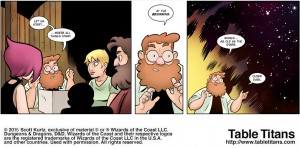Any tabletop roleplaying game has two main roles: that of the player, and that of the Game Master. Different game systems have different names for this person, like Storyteller or Dungeon Master, even simply being called a referee (originating from wargaming roots). Game Master (GM for short) tends to be the most system-neutral and common title, so I’ll be sticking with that, though later in this article I want to talk about how the GM’s name affects expectations in play.
So what does a GM do? If a trpg is a movie where the players are the actors, then the GM takes on every other role. They pick the setting, the lighting, the background music, and play the roles of the extras and side characters in the movie. They write and direct, and usually are the people to determine when the screening is going to be. What I’m saying is GMs do a huge amount of work, and also have a huge amount of control over what is going to actually happen in their games.

This is a huge amount of work for one person to take on. And like any leadership position, people have different reasons for taking it on. For some it’s just the only way a game will happen. None of their friends wanted to run a game, so they did. For others it’s a creative adventure, being able to write an engrossing fantasy novel and see, in real time, how people react to it. Others like being able to share a bonding experience between people, and knowing that they were responsible for it happening. There are even those just interested in the sheer numbers of it, building and fiddling with mechanics and watching people pick them apart. For some it’s a mix of all of these, but in general it’s agreed that the best GM’s are interested in the social, creative, and mechanical aspects of running a game.
A GM is also a sort of feudal lord. They have final say over most rulings, traditionally. They decide who is allowed to play in the game, they decide what game to play, what atmosphere it has, and they technically can control what the characters can and cannot do, or what kinds of characters the players can be. Because the game doesn’t exist without the GM, they have complete control.
However, if a GM abuses this power, there is always potential for an uprising. Because, while a game definitely won’t exist without a GM, it also can’t exist without players, though players are in more abundant supply. Therefore the GM has to strike a balance, running the sort of game they want to run, while equally being subservient to the player needs. In conversations with GMs, one specifically was very invested in the idea of the GM as being there for the support of the players. He loves running games to create cool moments for the players, to make them feel better about themselves. There are plenty of stories of the opposite, GMs that relish smashing players to bits, or using the players to act out the GM’s fantasies. While some players may like lethal challenges, or a more railroaded adventure, this is hardly a universal trait.
A GM has power in the real world as well as the fictional world of the game, and those two zones have to interact. In the real world, it is usually the GM who plans when the games are, and invites players to the game. Other players may invite new people, but it’s a breach of etiquette to do so without at least giving the GM a heads up. The GM usually has final say over where the game is played as well. Players frequently give the GM status even outside of the game needs; a tie between pizza topping votes is usually decided by the GM. These may seem like irrelevant points of power, but they are points of power nonetheless.
So the GM has a unique role within the game. All of the players do roughly the same job, acting as individual characters within the game. But the GM, as the saying goes “wears many hats.” And there’s rarely a questioning of why some of those hats are even there. The GM in charge of when the game is going to happen, and in charge of sending out messages to players if plans need changing. Usually they are the ones expected to be able to lend out books or PDFs of the game to new players. Theoretically all they should be responsible for is the actual showing up and running of a game, but they also get the burden of these additional duties. Some of these responsibilities makes sense. A GM should know all of the rules of the game, and in order to do so usually has a copy of the game’s rulebook. Other players may have their own copies, but the GM is the only one that definitely needs one, so they are usually the one to go to to borrow a book. Scheduling is partially due to the fact that the GM is the one necessary member of the group, so their schedule must be considered first, but many groups only play with the full group in attendance (or no more than one absence). The GM is just already stationed in a position of power, so they are expected to just take command of everything.
It does increase the capabilities needed in a GM, which results in some positive skills learned. They not only have to run a game, they have to act as a small-group manager, getting schedules and carpools set up for often up to seven other people. This is increasingly important in a job market that values self-sufficiency and leadership abilities.
So based on the above, it sounds like the GM is considered the “most important” member. And that has a grain of truth. With no GM there is no game, but a game can run with one of the players missing. But I don’t believe that’s entirely it.

A player is placing their virtual life in the hand of the GM. A good GM treats this trust with respect, and in the fuzzy barrier between character and player, the GM gains a sort of unquestioned respect. A player in a trpg doesn’t question why there is a castle in the mountains, that’s the GM’s duty to worry about. If they say something is there, it’s there. There’s no questioning that in game reality, because the GM is the only ultimate definer of what is inherently a negotiated reality. So players have a mentality of the GM as final game arbiter, and especially in more lengthy or in depth roleplay, that sense of authority sticks.
The GM in turn gets a huge amount of leadership experience. It turns out that the amount of control a GM is given over such an infinite landscape, along with having to organize and coordinate a team, is great training for leadership opportunities outside of games. A GM has to be able to read the group, to tell when they’re getting bored and when to pick up the pace, just like any presenter in any office building (though the GM does have the advantage of wizards and dragons). They need to have the work ethic and passion to build up a lot of notes and prepare for games. This involves keeping track of individual character player stats, detailed plot points, etc. There’s also the difficulty of arranging schedules, rides, and food for a group of 3-8 other people who all have life and jobs and other relationships. They get experienced with holding authority positions in a space where the players are inherently dependent on them.
Now, there are some games that don’t need a GM. However many of these are testing the boundaries of what a tabletop rpg is or entails, what delineates it from a board game. A GM is something that I believe is not entirely essential, but ranks pretty high up there to an inherent part of a trpg, along with dice and character records.
Before I finish here, I want to talk about how even between systems, a different expectation is given the GM, framed by the rules they use. Traditional Dungeons and Dragons calls for a Dungeon Master. This is partially strong branding, but also defines what was expected of the game. There’s a reason D&D helped birth the trope of the “Dungeon Crawler” (for those who don’t know as well, a dungeon crawler is typically a low-story game where a group of adventurers fights there way through a series of rooms in an enclosed space. Typically this would be the dungeon under a castle, hence the name.) The DM is somebody who is a rules arbiter, and also a fiendish dungeon developer. Those expectations are given just through their label, and DM is still a term used commonly to this day, especially in games where this sort of enclosed, hack and slash environment is encouraged.
On the opposite side of the spectrum, White Wolf’s World of Darkness game line has Storytellers. Their label doesn’t denote mechanical mastery. A Dungeon Master is king of their domain. A Storyteller is as well, but the feeling comes across more softly, more open for collaboration, and, obviously, more story/roleplay focused (some might argue that “Storyteller” is a kinda pretentious title to give somebody running a game, but each to their own.) Again, the title alone is setting up a series of expectations for a game before the game has even been played. Flip through some of the books you have, what sort of titles does the referee get? What do they say about the game?
And since we were talking about all of a GM’s hats earlier, do you think being a GM has any non-gaming applicability? How could this sort of experience be applied to other spaces? Could it be?